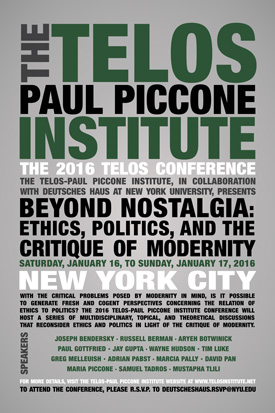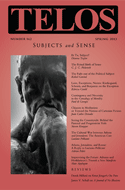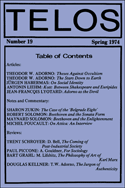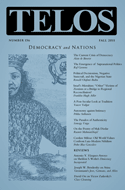By Jay A. Gupta · Friday, July 8, 2016 A recent piece in the Atlantic by Jonathan Merritt declares the “death of moral relativism.” It echoes observations made by other pundits that there seems to have been a shift in cultural attitudes concerning morality. In the United States, subjectivist, relativist, and “postmodernist” stances are said to have been replaced by robust commitments to social justice, tolerance, and inclusion. David Brooks also, for example, discusses the rise of a veritable “shame culture,” particularly evident on American college campuses and social media, ready to condemn and ostracize those who fail to acknowledge the importance of upholding these new, powerful norms of respect and recognition for the marginalized and oppressed. Indeed, the trend is so omnipresent that there has been significant backlash—critics decry the policing efforts of “social justice warriors” and the scourge of “political correctness.”
Continue reading →
By Vicente Medina · Friday, February 12, 2016 The following paper was presented at the 2016 Telos Conference, held on January 16–17, 2016, in New York City. For additional details about upcoming conferences and events, please visit the Telos-Paul Piccone Institute website.
 While the expression “moral relativism” means different things to different people, I offer the following characterization of it. By “moral relativism,” I understand a normative view that explains people’s incommensurable moral judgments based on their subjective preferences or on different action-guiding contexts. Moral relativists deny that value judgments can be universally justified. Therefore, for them, value judgments have neither objective universal truth-value nor universal moral import. That is, these judgments are neither true nor false, nor right or wrong for everyone. For some moral relativists even to raise the possibility of moral disagreement across different cultures or communities would be simply moot. While the expression “moral relativism” means different things to different people, I offer the following characterization of it. By “moral relativism,” I understand a normative view that explains people’s incommensurable moral judgments based on their subjective preferences or on different action-guiding contexts. Moral relativists deny that value judgments can be universally justified. Therefore, for them, value judgments have neither objective universal truth-value nor universal moral import. That is, these judgments are neither true nor false, nor right or wrong for everyone. For some moral relativists even to raise the possibility of moral disagreement across different cultures or communities would be simply moot.
Moral relativists can assume a subjective or a contextual point of view. If they assume a subjective point of view, one might describe their theories or hypotheses as nihilistic. Nihilists recognize no transcendent moral values and no moral facts. According to them, predicates, such as right or wrong, or good or bad, have no independent reference. So nihilists recognize no significant moral difference between, for example, the deliberate killing of the objectively innocent, which is considered murder by most civilized people, and killing in self-defense. For them, even the principle of the presumption of innocence would be vacuous.
Continue reading →
By Lukas Szrot · Wednesday, September 9, 2015 Anthony M. Matteo’s “In Defense of Moral Realism” offers a fascinating argument. He begins with the seemingly innocuous premise that philosophy, and by extension theorizing of any stripe, should be linked to what people actually do. Philosophy of science is his analogue, the obtuse, jargon-laden pages of such work often seeming to generate little useful insight for the practitioners of science. An account of morality, by analogy, should be useful to practicing moral agents.
Continue reading →
By Paul di Georgio · Thursday, May 2, 2013 Paul di Georgio’s “Contingency and Necessity in the Genealogy of Morality” appears in Telos 162 (Spring 2013). Read the full version online at the Telos Online website, or purchase a print copy of the issue in our store.
 This article evaluates the relationship of the concepts of contingency and necessity to the historical developments and power relations in Nietzsche’s Genealogy. Both Nietzsche and Foucault maintain that, contra Herder, their genealogies are not grounded in originary investigation. Thus for their sort of genealogy to be a philosophically useful method, the force of interpretive analysis must be located elsewhere. The analytic force, I argue, is based in the relationship of values, events, and moral beings. Specifically, I maintain that the progression of moral stages in Nietzsche’s study is ordered in such a way that the failure of each stage is logically and structurally necessary, and that each failure structures the resultant system or paradigm. However, we must also note that the historical manifestation of moral paradigms which coincide with predicted or projected theoretical structures remains contingent upon a multitude of other historical factors, most importantly, human involvement. The conclusion is that systematic internal failures of moral stages allow for but do not cause successive events, since the structural scope of possibility within which a value may be held is best explained in terms of a “middle space” characterizable in both contingent and necessary terms. This article evaluates the relationship of the concepts of contingency and necessity to the historical developments and power relations in Nietzsche’s Genealogy. Both Nietzsche and Foucault maintain that, contra Herder, their genealogies are not grounded in originary investigation. Thus for their sort of genealogy to be a philosophically useful method, the force of interpretive analysis must be located elsewhere. The analytic force, I argue, is based in the relationship of values, events, and moral beings. Specifically, I maintain that the progression of moral stages in Nietzsche’s study is ordered in such a way that the failure of each stage is logically and structurally necessary, and that each failure structures the resultant system or paradigm. However, we must also note that the historical manifestation of moral paradigms which coincide with predicted or projected theoretical structures remains contingent upon a multitude of other historical factors, most importantly, human involvement. The conclusion is that systematic internal failures of moral stages allow for but do not cause successive events, since the structural scope of possibility within which a value may be held is best explained in terms of a “middle space” characterizable in both contingent and necessary terms.
Continue reading →
By Yonathan Listik · Tuesday, March 12, 2013
As an occasional feature on TELOSscope, we highlight a past Telos article whose critical insights continue to illuminate our thinking and challenge our assumptions. Today, Yonathan Listik looks at Jürgen Habermas’s “On Social Identity,” from Telos 19 (Spring 1974).
 Jürgen Habermas’s objective in “On Social Identity” is clearly defending the usage of instrumental rationality toward the development of a universal morality. For Habermas, the new social identity should be constructed through universalistic moral systems, thereby eliminating possible frictions or incoherence present in modern society. The obsolescence of the state and its replacement by autonomous means of identity construction, such as art, already point to his emphasis on a more particular form of identity construction. Jürgen Habermas’s objective in “On Social Identity” is clearly defending the usage of instrumental rationality toward the development of a universal morality. For Habermas, the new social identity should be constructed through universalistic moral systems, thereby eliminating possible frictions or incoherence present in modern society. The obsolescence of the state and its replacement by autonomous means of identity construction, such as art, already point to his emphasis on a more particular form of identity construction.
Continue reading →
By Ronald Olufemi Badru · Saturday, October 8, 2011 Ronald Olufemi Badru’s “The Ontology of Political Decisionism, Negative Statecraft, and the Nigerian State: Exploring Moral Altruism in Politics” appears in Telos 156 (Fall 2011). Read the full version online at the TELOS Online website, or purchase a print copy of the issue here.
 This exercise in political philosophy adopts the research methods of conceptual analysis, extensive argumentation, and historical account. Using the theoretical framework of political decisionism, espoused by the German political philosopher Carl Schmitt, the essay attempts to explain the operation of the main actors within Nigeria’s political space. There are two central claims. First, Nigeria’s political leadership has detached morality from the political sphere; political leaders have covertly eroded the authority of both legal and moral norms in satisfying their egoistic interests. Second, the political class regards one another as enemies, leading to numerous incidents of political assassinations and killings among them. These claims aptly instantiate and summarize the Schmittian political decisionism in Nigeria’s politics. However, the paper concludes that since politics in the ideal is service to the public, for an all-round development, and the egoism of political decisionism resists this objective, then there ought to be a new morality of altruism in Nigeria’s politics. Committing to the welfare of the other, rather than that of the self, moral altruism ensures that politics is rightly conducted in Nigeria to achieve the well being of the general other, leading to an all-inclusive social development in the final analysis. This exercise in political philosophy adopts the research methods of conceptual analysis, extensive argumentation, and historical account. Using the theoretical framework of political decisionism, espoused by the German political philosopher Carl Schmitt, the essay attempts to explain the operation of the main actors within Nigeria’s political space. There are two central claims. First, Nigeria’s political leadership has detached morality from the political sphere; political leaders have covertly eroded the authority of both legal and moral norms in satisfying their egoistic interests. Second, the political class regards one another as enemies, leading to numerous incidents of political assassinations and killings among them. These claims aptly instantiate and summarize the Schmittian political decisionism in Nigeria’s politics. However, the paper concludes that since politics in the ideal is service to the public, for an all-round development, and the egoism of political decisionism resists this objective, then there ought to be a new morality of altruism in Nigeria’s politics. Committing to the welfare of the other, rather than that of the self, moral altruism ensures that politics is rightly conducted in Nigeria to achieve the well being of the general other, leading to an all-inclusive social development in the final analysis.
Continue reading →
|
|
 While the expression “moral relativism” means different things to different people, I offer the following characterization of it. By “moral relativism,” I understand a normative view that explains people’s incommensurable moral judgments based on their subjective preferences or on different action-guiding contexts. Moral relativists deny that value judgments can be universally justified. Therefore, for them, value judgments have neither objective universal truth-value nor universal moral import. That is, these judgments are neither true nor false, nor right or wrong for everyone. For some moral relativists even to raise the possibility of moral disagreement across different cultures or communities would be simply moot.
While the expression “moral relativism” means different things to different people, I offer the following characterization of it. By “moral relativism,” I understand a normative view that explains people’s incommensurable moral judgments based on their subjective preferences or on different action-guiding contexts. Moral relativists deny that value judgments can be universally justified. Therefore, for them, value judgments have neither objective universal truth-value nor universal moral import. That is, these judgments are neither true nor false, nor right or wrong for everyone. For some moral relativists even to raise the possibility of moral disagreement across different cultures or communities would be simply moot.  This article evaluates the relationship of the concepts of contingency and necessity to the historical developments and power relations in Nietzsche’s Genealogy. Both Nietzsche and Foucault maintain that, contra Herder, their genealogies are not grounded in originary investigation. Thus for their sort of genealogy to be a philosophically useful method, the force of interpretive analysis must be located elsewhere. The analytic force, I argue, is based in the relationship of values, events, and moral beings. Specifically, I maintain that the progression of moral stages in Nietzsche’s study is ordered in such a way that the failure of each stage is logically and structurally necessary, and that each failure structures the resultant system or paradigm. However, we must also note that the historical manifestation of moral paradigms which coincide with predicted or projected theoretical structures remains contingent upon a multitude of other historical factors, most importantly, human involvement. The conclusion is that systematic internal failures of moral stages allow for but do not cause successive events, since the structural scope of possibility within which a value may be held is best explained in terms of a “middle space” characterizable in both contingent and necessary terms.
This article evaluates the relationship of the concepts of contingency and necessity to the historical developments and power relations in Nietzsche’s Genealogy. Both Nietzsche and Foucault maintain that, contra Herder, their genealogies are not grounded in originary investigation. Thus for their sort of genealogy to be a philosophically useful method, the force of interpretive analysis must be located elsewhere. The analytic force, I argue, is based in the relationship of values, events, and moral beings. Specifically, I maintain that the progression of moral stages in Nietzsche’s study is ordered in such a way that the failure of each stage is logically and structurally necessary, and that each failure structures the resultant system or paradigm. However, we must also note that the historical manifestation of moral paradigms which coincide with predicted or projected theoretical structures remains contingent upon a multitude of other historical factors, most importantly, human involvement. The conclusion is that systematic internal failures of moral stages allow for but do not cause successive events, since the structural scope of possibility within which a value may be held is best explained in terms of a “middle space” characterizable in both contingent and necessary terms.  Jürgen Habermas’s objective in “On Social Identity” is clearly defending the usage of instrumental rationality toward the development of a universal morality. For Habermas, the new social identity should be constructed through universalistic moral systems, thereby eliminating possible frictions or incoherence present in modern society. The obsolescence of the state and its replacement by autonomous means of identity construction, such as art, already point to his emphasis on a more particular form of identity construction.
Jürgen Habermas’s objective in “On Social Identity” is clearly defending the usage of instrumental rationality toward the development of a universal morality. For Habermas, the new social identity should be constructed through universalistic moral systems, thereby eliminating possible frictions or incoherence present in modern society. The obsolescence of the state and its replacement by autonomous means of identity construction, such as art, already point to his emphasis on a more particular form of identity construction.  This exercise in political philosophy adopts the research methods of conceptual analysis, extensive argumentation, and historical account. Using the theoretical framework of political decisionism, espoused by the German political philosopher Carl Schmitt, the essay attempts to explain the operation of the main actors within Nigeria’s political space. There are two central claims. First, Nigeria’s political leadership has detached morality from the political sphere; political leaders have covertly eroded the authority of both legal and moral norms in satisfying their egoistic interests. Second, the political class regards one another as enemies, leading to numerous incidents of political assassinations and killings among them. These claims aptly instantiate and summarize the Schmittian political decisionism in Nigeria’s politics. However, the paper concludes that since politics in the ideal is service to the public, for an all-round development, and the egoism of political decisionism resists this objective, then there ought to be a new morality of altruism in Nigeria’s politics. Committing to the welfare of the other, rather than that of the self, moral altruism ensures that politics is rightly conducted in Nigeria to achieve the well being of the general other, leading to an all-inclusive social development in the final analysis.
This exercise in political philosophy adopts the research methods of conceptual analysis, extensive argumentation, and historical account. Using the theoretical framework of political decisionism, espoused by the German political philosopher Carl Schmitt, the essay attempts to explain the operation of the main actors within Nigeria’s political space. There are two central claims. First, Nigeria’s political leadership has detached morality from the political sphere; political leaders have covertly eroded the authority of both legal and moral norms in satisfying their egoistic interests. Second, the political class regards one another as enemies, leading to numerous incidents of political assassinations and killings among them. These claims aptly instantiate and summarize the Schmittian political decisionism in Nigeria’s politics. However, the paper concludes that since politics in the ideal is service to the public, for an all-round development, and the egoism of political decisionism resists this objective, then there ought to be a new morality of altruism in Nigeria’s politics. Committing to the welfare of the other, rather than that of the self, moral altruism ensures that politics is rightly conducted in Nigeria to achieve the well being of the general other, leading to an all-inclusive social development in the final analysis. 






